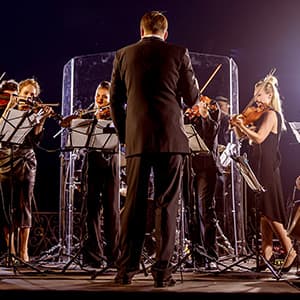

Beethovens Emperor Tickets
No Buyer Fees on Beethovens Emperor Tickets and Up to 30% Off Compared to Competitors. Learn More →
Select Location (e.g, New York)
Events Nearby
We're Sorry. There are currently no events near you.
Frequently Asked Questions About Beethoven's Emperor Tickets and Events
What is the significance of Beethoven's Emperor Concerto in classical music?
Beethoven's Emperor Concerto, officially known as Piano Concerto No. 5 in E-flat major, Op. 73, is significant for its grand scale and innovative structure, representing the height of the classical concerto form and showcasing Beethoven's mastery of orchestration and piano technique.
Who typically performs Beethoven's Emperor Concerto?
Beethoven's Emperor Concerto is typically performed by professional orchestras, often featuring a renowned pianist as the soloist, as it requires exceptional skill and interpretation to convey the piece's emotional depth.
What are the key themes explored in Beethoven's Emperor Concerto?
The key themes in Beethoven's Emperor Concerto include triumph, heroism, and the interplay between the piano and orchestra, reflecting the composer's personal struggles and artistic vision during its creation.
How does the orchestration in Beethoven's Emperor Concerto differ from his earlier concertos?
The orchestration in Beethoven's Emperor Concerto is more expansive and sophisticated than in his earlier concertos, featuring a larger orchestra and more intricate interactions between the piano and orchestral parts, which enhance the overall dramatic effect.
What is the historical context of Beethoven's Emperor Concerto?
Composed between 1809 and 1811, Beethoven's Emperor Concerto was created during a time of personal and political turmoil in Europe, reflecting the Romantic ideals of heroism and individual expression that were emerging in music and art.
What are some notable recordings of Beethoven's Emperor Concerto?
Notable recordings of Beethoven's Emperor Concerto include performances by celebrated pianists such as Wilhelm Kempff, Arthur Rubinstein, and Maurizio Pollini, each bringing their unique interpretation to this iconic work.
What skills does a pianist need to perform Beethoven's Emperor Concerto?
A pianist needs exceptional technical proficiency, interpretative insight, and emotional expressiveness to perform Beethoven's Emperor Concerto, as it features complex passages and requires a deep understanding of the piece's structure and themes.
What impact did Beethoven's Emperor Concerto have on future piano concertos?
Beethoven's Emperor Concerto had a profound impact on future piano concertos by expanding the possibilities of the soloist's role, influencing composers like Brahms and Rachmaninoff, who drew inspiration from its grandeur and emotional depth.
What is the typical structure of Beethoven's Emperor Concerto?
The typical structure of Beethoven's Emperor Concerto consists of three movements: an Allegro, a Largo, and a Rondo, each showcasing different musical ideas and contrasting tempos, culminating in a vibrant and energetic finale.
How does Beethoven's Emperor Concerto reflect the characteristics of the Romantic era?
Beethoven's Emperor Concerto reflects the characteristics of the Romantic era through its emphasis on emotional expression, individualism, and the exploration of new musical forms, setting the stage for the Romantic composers who followed.